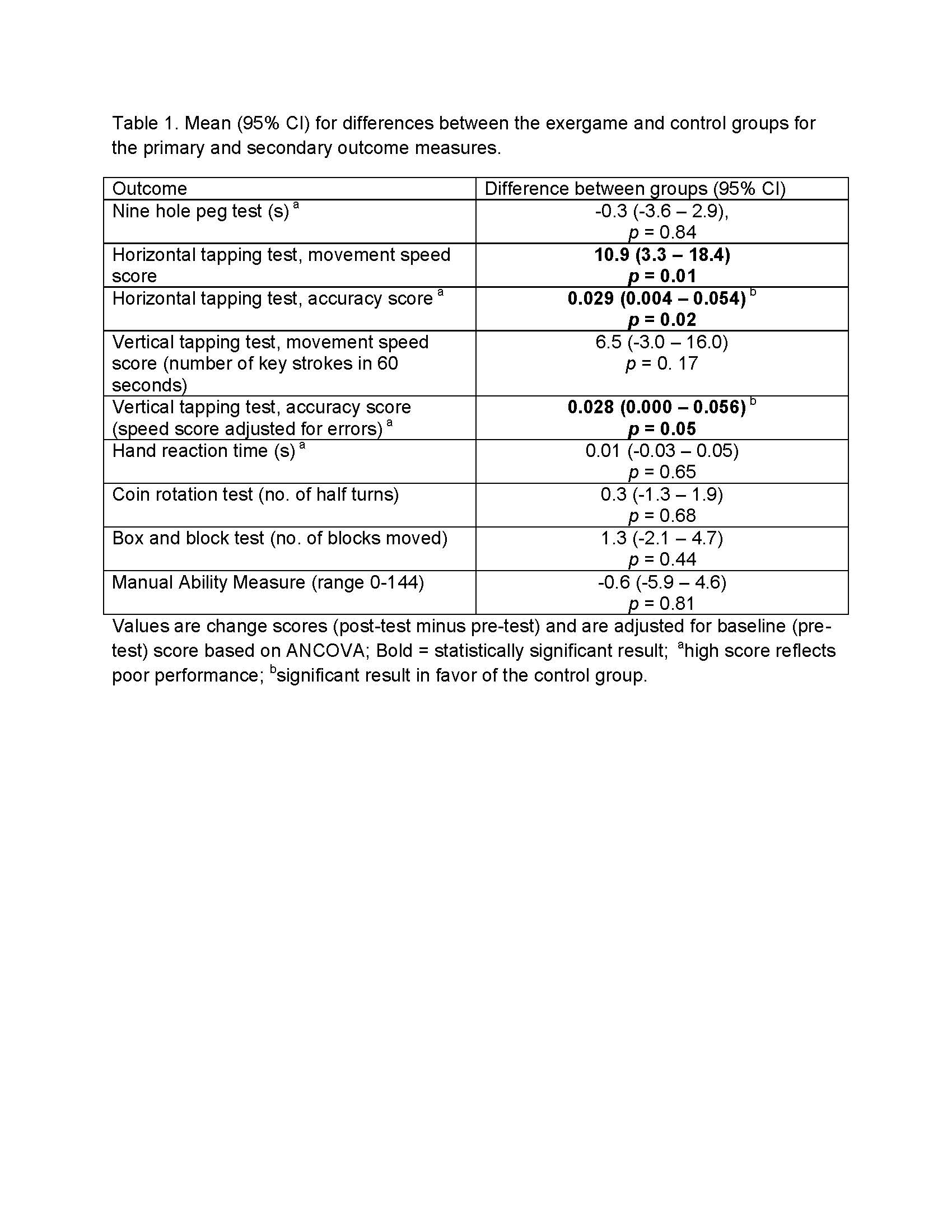Session Information
Date: Thursday, June 8, 2017
Session Title: Parkinson’s Disease: Clinical Trials, Pharmacology And Treatment
Session Time: 1:15pm-2:45pm
Location: Exhibit Hall C
Objective: To determine if home-based exergames targeting the upper extremities (UE) improves arm and hand activities and impairments in people with PD. To establish the feasibility and acceptability of the games.
Background: People with PD have difficulty performing activities with their UE, however there is a paucity of research investigating potential interventions. Exergames have the potential to provide UE exercise in an engaging and sustainable format.
Methods: Participants with PD were randomized to an exergame (n = 19) or control (n=19) group. The exergame group performed arm and hand games in sitting, using a table top mat, keyboard and tablet, in their home 3 times per week for 12 weeks. Two games were designed for the trial, one focused on movement timing and the other on movement speed. The control group continued with their usual activities. The primary outcome measure was the nine hole peg test. Secondary outcomes included the horizontal and vertical tapping test (movement speed and accuracy), hand reaction time, the Coin Rotation Task, the Box and Block test, and the Manual Ability Measure-36 questionnaire. The feasibility of and adherence to the exergames were assessed through a questionnaire, log books and phone calls.
Results: Following the exergames there was no difference between the groups in the nine hole peg test [table1]. Tapping test results showed that participants in the exergame group improved in speed of movement, but deteriorated in the accuracy of movement compared to the control group. There were no differences in any other secondary outcome measures. Participants in the exergame group completed 82% of the prescribed games. Most participants (69%) enjoyed the games and reported the feedback provided by the system was helpful and motivating. However, participants tired of playing the same 2 games for 12 weeks. There were no adverse events.
Conclusions: The UE exergame was safe and feasible, however it did not improve participants’ ability to perform activities. The increased movement speed with a corresponding reduction in movement accuracy may have been due to the requirements of the games, as there was no penalty for inaccurate responses. Results suggest that future research of exergames should consider specificity of task practice and variety of game play.
To cite this abstract in AMA style:
N. Allen, J. Song, S. Paul, S. Smith, J. O'Duffy, M. Schmidt, R. Love, C. Sherrington, C. Canning. Active Arms: a randomized controlled trial of an interactive videogame for people with Parkinson’s disease [abstract]. Mov Disord. 2017; 32 (suppl 2). https://www.mdsabstracts.org/abstract/active-arms-a-randomized-controlled-trial-of-an-interactive-videogame-for-people-with-parkinsons-disease/. Accessed October 15, 2025.« Back to 2017 International Congress
MDS Abstracts - https://www.mdsabstracts.org/abstract/active-arms-a-randomized-controlled-trial-of-an-interactive-videogame-for-people-with-parkinsons-disease/

